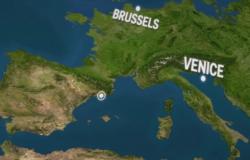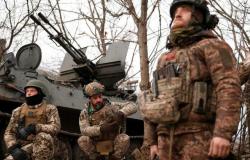“I would never have believed that I would be here calling for a greater commitment to sending weapons to help Ukraine”: the parable of the German Vice Chancellor and Minister of Economy Robert Habeck could be an example of the transformation of Western politics and above all European Union after two years of Russian bombs on Ukrainian cities. Habeck is a member of the Greens, an intellectual, an environmentalist, belonging to that European generation that entered politics in a world without the Berlin Wall, convinced that war would become an endangered phenomenon confined to remote places and backward people of the world. Yesterday, while the House of Representatives of the US Congress finally released the long-awaited aid package for the Ukrainian resistance, Habeck was in Kyiv leading a large delegation of important German industrialists, inaugurating new drone factories, negotiating the participation of Germany to post-war reconstruction and call for a more massive and above all quicker commitment from the West alongside the country led by Volodymyr Zelensky because “we need to understand the reasons for this war, with Vladimir Putin challenging democracy”.
A turning point that took two years to mature and metabolize, and which paradoxically perhaps would not have been accomplished with the same awareness without the stalemate in Congress over the aid package. Now, 61 billion dollars can be added to the 50 billion euros allocated by Europe, and to the aid of individual European countries. Many weapons had already been brought by the Pentagon to Poland, awaiting the vote, in order to be able to cross the Ukrainian border immediately. Among the most awaited supplies, the missiles for anti-aircraft defense – their lack had contributed, according to Zelensky, to the success of the Russian raids which destroyed power plants, condemning the Ukrainians to months of rationing of light and heating – and for the artillery forehead. It is true that Europe possesses arsenals of equally efficient weapons, but in addition to the problem of compatibility – maintaining and repairing different types of vehicles at the same time is practically impossible – there is that of quantity: to completely replace American military supplies the Old Continent would have to, according to the experts of the Kiel Institute, double production. Some types of missiles and artillery are also a Made in US specialty.
How efficient Western weapons are was seen very well in the recent Iranian attack against Israel, which aroused understandable bitterness among Ukrainians: despite the obvious differences in size, the almost total Israeli safety also highlighted a difference in political will . But observing for months the missiles launched on Putin’s orders falling every day on Ukrainian cities not only made it increasingly difficult for skeptics to argue their opposition to military assistance for Kyiv, it overturned the very vision of the problem: it was no longer a question to help an attacked country, driven by moral and political solidarity subject to pragmatic rethinking, but to review the very concept of continental security, and therefore to redesign its approach. Perhaps it was the first time in which the roles were reversed, and it was Europe that put pressure on Washington – also with a succession of diplomatic missions by different leaders, from the British David Cameron to the Polish Andrzej Duda – for greater involvement military, and not the other way around. A revolution that can be read today in the determination of the communiqués of the G7 and of those responsible for politics and defense, which matured just as Ukrainian commanders and Western analysts began to speak openly about a risk of “defeat” by Kyiv, hypothesized even by the director of the CIA William Burns.
An option that is not practicable for Ukraine, as Zelensky recalled yesterday by admitting the existence of “war fatigue”, which however does not mean “choosing capitulation to Russia”: “We are tired, but every morning we return to do what we have to do, live and defend our children,” he said in an interview on Brazilian television. Now, it is up to Kyiv, to its troops who in recent weeks have limited themselves almost exclusively to containing Russian advance attempts, to restore hope and overturn the balance on the field, in a match that no one hopes can be resolved with a blitz anymore. Moreover, Zelensky had already announced the launch of a national war production program, to no longer have to depend on Europe and America. Just yesterday the Minister of Strategic Industries, Oleksandr Kamyshin, explained that the Ukrainian industry has a production potential that exceeds by at least three times the mere 6 billion euros in financing that Kyiv manages to allocate.
Tags: Pressure Washington alliances dictates line war time






